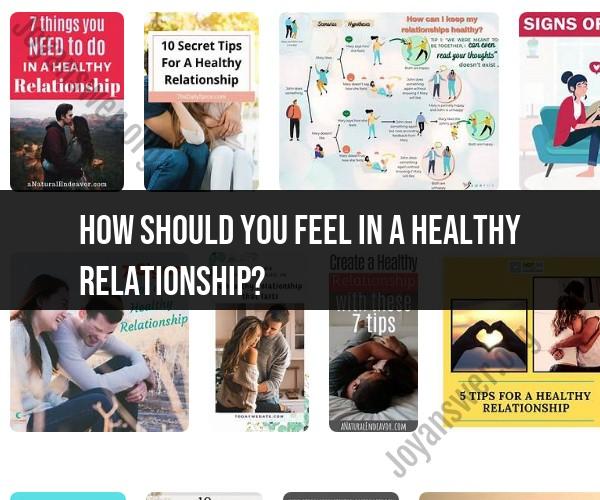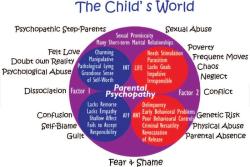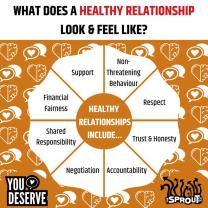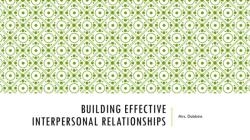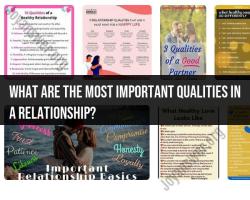How should you feel in a healthy relationship?
In a healthy relationship, you should experience a range of positive emotions and feelings that contribute to your overall well-being. Here are some feelings and expectations you can have in a healthy relationship:
Safety and Security: You should feel safe and secure with your partner. Trust is a foundational element of a healthy relationship, and you should know that your emotional and physical well-being are protected.
Respect: Respect is a fundamental aspect of a healthy relationship. You should feel respected and valued for who you are, your opinions, and your boundaries.
Happiness and Contentment: A healthy relationship should bring happiness and contentment. You should feel joyful, loved, and generally positive about the time you spend with your partner.
Support and Encouragement: Your partner should be your biggest cheerleader. In a healthy relationship, you'll feel supported and encouraged to pursue your goals, dreams, and personal growth.
Communication: Open and effective communication is key to a healthy relationship. You should feel comfortable discussing your thoughts, feelings, and concerns with your partner, and they should be responsive and attentive.
Trust and Loyalty: Trust is a cornerstone of any healthy relationship. You should have confidence in your partner's fidelity, reliability, and honesty.
Intimacy: Emotional and physical intimacy should be fulfilling and consensual. You should feel a strong connection with your partner and experience physical affection that makes you feel loved and desired.
Independence: A healthy relationship allows for individual growth and independence. You should feel free to maintain your own interests, friendships, and activities outside the relationship.
Equality: A healthy relationship is built on mutual respect and equality. You should feel that decisions and responsibilities are shared fairly, and there is no dominance or control exerted by either partner.
Compromise: Healthy relationships involve compromise and problem-solving. You should feel that both you and your partner are willing to find solutions that work for both of you when conflicts arise.
Empathy and Understanding: Your partner should show empathy and understanding toward your feelings and experiences. You should feel heard and supported, even when you have differing viewpoints.
Fun and Enjoyment: A healthy relationship should be fun and enjoyable. You should have moments of laughter and shared experiences that bring joy to your life.
Freedom from Fear and Manipulation: In a healthy relationship, you should not feel manipulated, threatened, or coerced. You should not experience fear, intimidation, or emotional abuse.
Peace and Calm: While all relationships have their ups and downs, a healthy relationship should generally bring a sense of peace and calm into your life, rather than constant stress and turmoil.
Self-Esteem and Self-Worth: A good relationship should enhance your self-esteem and self-worth. You should feel loved and appreciated, and your partner's actions should make you feel good about yourself.
If you find that your relationship consistently lacks these positive feelings or if you experience negative emotions like fear, insecurity, or constant stress, it may be a sign that the relationship is unhealthy or even abusive. In such cases, seeking support from a counselor, therapist, or a trusted friend can help you navigate the situation and make decisions that are in your best interest.
What are the emotional indicators of a healthy relationship?
Emotional indicators of a healthy relationship include:
- Trust: You feel safe and secure in your relationship. You can trust your partner to be honest with you and to have your best interests at heart.
- Respect: You and your partner respect each other's opinions, feelings, and boundaries. You feel valued and appreciated.
- Communication: You and your partner communicate openly and honestly with each other. You are able to talk about your needs and wants, and you are willing to listen to your partner's needs and wants as well.
- Intimacy: You feel close and connected to your partner. You are able to share your deepest thoughts and feelings with them, and you feel supported by them.
- Support: You and your partner support each other through thick and thin. You are there for each other during difficult times, and you celebrate each other's successes.
How should you feel when you're in a healthy relationship?
When you are in a healthy relationship, you should feel:
- Loved and cherished. You should feel loved and accepted by your partner for who you are.
- Safe and secure. You should feel safe and secure in your relationship. You should trust your partner and feel confident in their love for you.
- Happy and fulfilled. A healthy relationship should bring you joy and happiness. You should feel good about yourself and your relationship.
Is it normal to experience ups and downs in a healthy relationship?
Yes, it is normal to experience ups and downs in a healthy relationship. No relationship is perfect, and there will be times when you and your partner disagree or have conflict. However, if you are able to communicate effectively and work through your problems together, your relationship will emerge stronger.
What are the signs of a toxic or unhealthy relationship?
Signs of a toxic or unhealthy relationship include:
- Control: Your partner tries to control your life and your decisions. They may tell you who you can and cannot see, what you can and cannot wear, or what you can and cannot do.
- Jealousy and possessiveness: Your partner is jealous and possessive. They may constantly accuse you of cheating or flirting with other people.
- Verbal and emotional abuse: Your partner puts you down, insults you, or threatens you. They may make you feel worthless or unlovable.
- Physical abuse: Your partner hits, punches, or shoves you. They may also damage your property or threaten to hurt you or someone you love.
If you are in a toxic or unhealthy relationship, it is important to seek help. You can talk to a trusted friend or family member, or you can contact a professional therapist or counselor.
Can you describe the importance of personal well-being within a healthy relationship?
Personal well-being is important within a healthy relationship because it allows you to be the best partner you can be. When you are taking care of yourself, you are more likely to be happy, healthy, and fulfilled. This can have a positive impact on your relationship as a whole.
There are a number of things you can do to promote your personal well-being within a healthy relationship, such as:
- Make time for yourself. It is important to schedule time for yourself each week to do things that you enjoy and that make you feel good. This could include reading, taking a walk, spending time with friends, or doing something creative.
- Take care of your physical health. Eat a healthy diet, get regular exercise, and get enough sleep. Taking care of your physical health will give you more energy and help you to feel better overall.
- Set boundaries. It is important to set boundaries with your partner and with other people in your life. This means communicating what you are and are not comfortable with, and sticking to your boundaries.
- Communicate with your partner. If you are feeling stressed, overwhelmed, or unhappy, talk to your partner about it. They should be supportive and understanding.
If you are struggling to maintain your personal well-being within your relationship, it is important to seek help from a professional therapist or counselor. They can help you to identify the challenges you are facing and develop strategies for coping with them.
